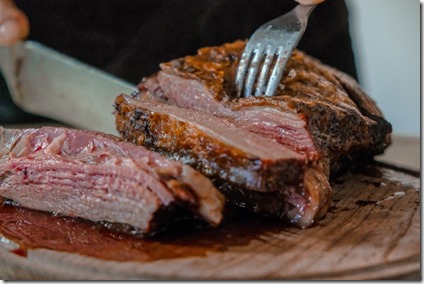 You are given a plate as you enter the buffet line. Your friend had been raving about how wonderful this buffet was, and he finally talked you into coming. To be honest, you’re not very pleased with the selection. The selection is horrible, the meat looks only a step above a Carl Buddig ham sandwich, and the mashed potatoes are clearly from a cheap box of instant taters. But you dutifully fill up your plate—hoping that the drinks will help you was down this poor excuse for a buffet.
You are given a plate as you enter the buffet line. Your friend had been raving about how wonderful this buffet was, and he finally talked you into coming. To be honest, you’re not very pleased with the selection. The selection is horrible, the meat looks only a step above a Carl Buddig ham sandwich, and the mashed potatoes are clearly from a cheap box of instant taters. But you dutifully fill up your plate—hoping that the drinks will help you was down this poor excuse for a buffet.
Just as you begin to sit down you notice a little room off to the side with a long line protruding from it. You have a little space left on you plate, so you step in that line in the hopes that you’ll be able to scooch over your soggy mac and get a little slice of edible pie or something. As you get closer to this buffet you realize that the meat is prime, the sides are delightful, and the vegetables look shockingly edible.
But you’ve only got a little spot left on your tray. What do you do? Do you double down and decide to just eat your “chicken that tastes like wood”, do you try to just pile the good stuff over top of the nasty, or do you ditch the whole tray and start fresh?
If you decide to dump the tray entirely you’ve engaged in what the Bible calls repentance. In the above scenario the decision seems obvious. And it seems obvious because there is something missing, emotionally, in the story. You aren’t dedicated to your pig slop in the above scenario. You realize that the mashed potatoes are boxed taters, you aren’t duped into thinking they are luxurious. The world, our flesh, and the devil are far more tricksy. But I share that above scenario to help Mark 1:14-15 make sense.
14 Now after John was arrested, Jesus came into Galilee, proclaiming the gospel of God, 15 and saying, “The time is fulfilled, and the kingdom of God is at hand; repent and believe in the gospel.”
We don’t tend to think of repentance as good news. But here Jesus is “proclaiming the gospel of God” and it seems that the context of this proclamation is that “the kingdom of God is at hand” and the only fitting response to this good news is to repent and believe that good news. We tend to think of repentance as the stuff of bitter battles and sorrowful and shame-filled stand-offs. But good news is actually what causes us to drop our slop bucket and stand in the line for the good stuff.
I’ve said before that I think the Puritan, Thomas Watson, might have gotten it backwards when he said, “until sin be bitter Christ will not be sweet.” I wonder if the beauty of the gospel is that the sweetness of Christ is what exposes the emptiness of sin.
When Jesus says that “the kingdom of God is at hand” you really only have three options.
1. Pit your kingdom against his
2. Try to add his kingdom to our own
3. Allow his kingdom to replace ours.
This is why Jesus says what he does about repentance and believing the gospel. By gospel he doesn’t mean the quite the same thing that Paul meant in 1 Corinthians 15. It would be a bit odd for Jesus to tell people to trust in his death and resurrection when those events have not yet happened. Instead what Jesus is calling people to do is to trust in the goodness of God’s kingdom, and entrust themselves to Jesus as the King of that kingdom. He is calling people to turn away from their own kingdom and replace it with His kingdom.
Drop your stank food entirely, grab a new plate, and feast upon the delicacies of Christ. That is the call of Mark 1:14-15. And we see this illustrated in the next passage. The calling of the first disciples is an apt illustration of what it means to “repent and believe the gospel.” It looks like “and immediately they left their nets and followed him”. They could have told him to buzz off. They could have attempted to add Jesus to their fishing business. But the beauty, as well as the demand, of Christ does not allow for these options.
—
Photo source: here